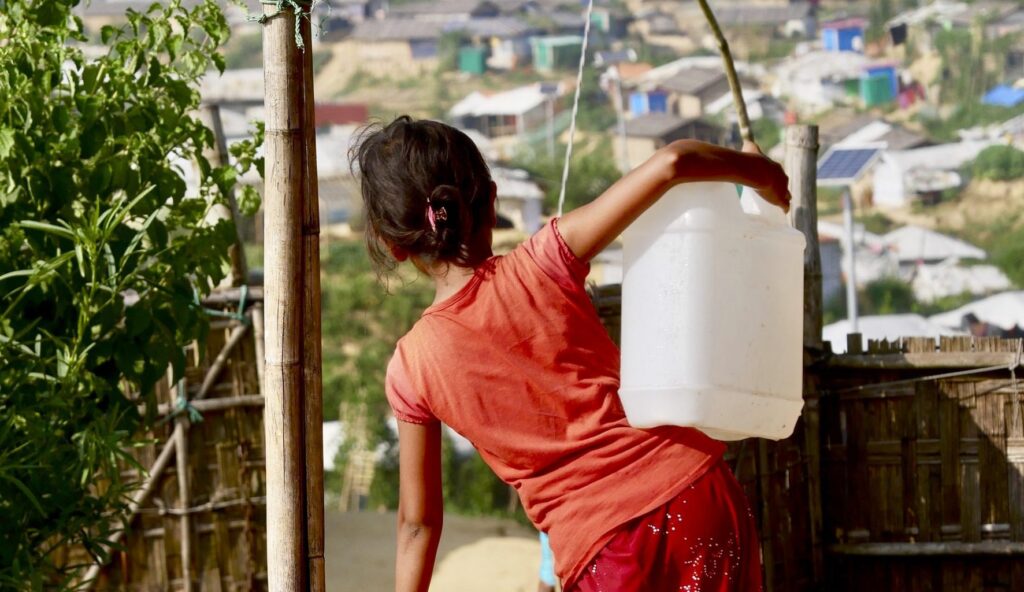Updates & Press
COVID-19 Stories | August 18, 2020
COVID-19 and the Vulnerable: Avoiding a Greater Cr
Author | MedGlobalComms

This blog post was written by Andrew Moran, Policy and Advocacy Intern at MedGlobal. Andrew has a BA in Political Science from Yale University. This post reflects his personal opinions.
As countries around the world experience massive spikes in COVID-19 cases, poor and marginalized groups suffer disproportionately. Among them, refugees, asylum seekers, migrants, and internally displaced persons are especially vulnerable to the effects of the pandemic. These groups are regularly excluded from national and local safety nets and health services and have become frequent targets of blame and abuse, including by the governments they rely on. It is crucial, now more than ever, to protect and care for the nearly 80 million forcibly displaced people in the world. Otherwise, in addition to avoidable deaths and a prolonged pandemic, xenophobia and discrimination towards them may become further entrenched.
Throughout history, refugees and migrants have been repeatedly scapegoated for disease, sometimes to distract from the failure of those in power to respond to crises, or simply to demonize them and justify their mistreatment. Agencies like the WHO explicitly discourage using the names of geographic locations or groups of people when referring to diseases. However, this has not stopped the proliferation of controversial nicknames for COVID-19. Indeed, the negative consequences and stigmatization of groups, which the WHO warns against, can be intentionally fostered to serve political purposes. The novelty of COVID-19 intensifies the effects of malicious branding by providing the unique opportunity to define the disease to an audience with few preconceived notions of it.
Some governments have used efforts to contain COVID-19 as justification for the implementation of harmful policies that target vulnerable groups. Tellingly, policies of evicting people from their homes and selectively locking down overcrowded camps are in direct opposition to health guidelines. Unfortunately, if not intentionally, the denunciation of refugees and migrants as carriers of disease can become a self-fulfilling prophecy when they are forced into overcrowded camps with inadequate access to food, water, sanitation, and health care. These circumstances create the ideal conditions for the rapid spread of COVID-19, which could go unnoticed due to limited testing. The eventual emergence of large clusters of cases in camps may be used to further incite fear or even violence against displaced persons.
Understanding how even responsible COVID-19 policies can negatively impact displaced populations is also critical for preventing unintended harm. One action many countries have taken in response to the pandemic is to close national borders and restrict movement internally. While this is often necessary to prevent and slow the spread of COVID-19, it can also have the effect of trapping people in dangerous situations. Violence, poverty, and hunger, all of which can force people to flee their homes, are not subsiding during the pandemic, but are being exacerbated by it. This year alone, an additional 71 million people are projected to fall into extreme poverty and 83 to 132 million more people are at risk of undernourishment. Understanding these pressures and surging responses to alleviate the burden on local communities is essential to avoid forced migration. In cases where illegal migration does occur, it is important to find alternatives to mass detention centers to avoid creating COVID-19 clusters, which would defeat the purpose of the restrictions in the first place.
Failing to care for the needs of vulnerable populations is not only a humanitarian issue, but also goes against the interests of host countries. Addressing stigmas around disease and barriers to accessing basic necessities is vital in avoiding a worsening health crisis. Including displaced peoples in response plans has never been more urgent. Burden sharing is also critical as 84% of all displaced people are hosted in developing countries with limited basic health services. However, as need is mounting, funding for humanitarian aid programs is dropping as donors respond to contracting economies. Reversing this trend now is crucial to prevent crises from intensifying and inevitably costing more in lives and resources to address in the future. Even if a COVID-19 vaccine is developed and made universally acceptable, the humanitarian disasters created and exacerbated by failing to act quickly and comprehensively could last multiple lifetimes.


